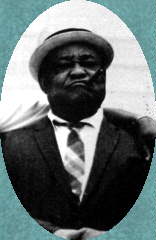
January 31, 1906 - July 17, 1984
Birthplace: Elmar, Arkansas
 |
Roosevelt Sykes January 31, 1906 - July 17, 1984 |
Roosevelt Sykes was one of the most important of the pre-World War
II blues piano stylists. With a technique that emphasized intricate chord patterns and
bass figures along with a crisp urban blues sensibility that would occasionally slip into
the jazz realm, Sykes was a first-rate solo artist and a much-in-demand accompanist. He
played major roles in both the St. Louis blues scene of the l930s and the Chicago blues
scene of the l940s. Over a career that spanned just about a half century, he recorded
regularly, performed extensively, and, in the process, helped elevate blues piano to a
high art.
Sykes was born in Arkansas but grew up in St. Louis. He learned to play the organ in
church and then used the skills to secure work as a barrelhouse piano player in the
Helena, Arkansas, area, often working with fellow pianist Lee Green. Sometime in the late
l920s Sykes returned to St. Louis and used the city as a base while making regular trips
to Memphis and Chicago. He first recorded in 1929. His version of the tune "Forty
Four Blues," which he learned from Green, was released on the Okeh label and helped
establish his reputation as a solid blues pianist.
Sykes spent the 1930s working St. Louis clubs as a solo artist or with other piano players
such as St. Louis Jimmy Oden. He recorded for Victor and Decca and other small labels,
often using a pseudonym (Dobby Bragg, Willie Kelly, or Easy Papa Johnson). He also did
session work and played the part of a talent scout.
In 1941 Sykes went to Chicago, where he continued all the things he'd been doing in St.
Louis. In addition, he frequently worked with Memphis Minnie,
recorded with the Jump Jackson Band, and recorded on his own and as an accompanist for the
Bluebird and Bullet labels. Nicknamed "The Honeydripper" for his way with women,
Sykes named his band the Honeydrippers and toured the South regularly during and just
after the war.
In 1954 when the Chicago blues scene began to favor the sound of the harder- edged
electric blues bands, Sykes left the city and moved to New Orleans. He found work
plentiful in the Crescent City and even played extended dates in St. Louis and Memphis,
right on into the 1960s. The recording dates continued as well. In 1960 he cut sides for
Decca and Prestige-Bluesville. In 1962 he recorded for Crown and in 1963 for Delmark.
Sykes also began to tour Europe and the U.S., cashing in on the early-'60s blues revival.
Sykes continued a full slate of touring and recording through the '70s and early '80s.
Although his dexterity had suffered somewhat, Sykes remained a convincing pianist to the
very end of his career. He died in 1984.